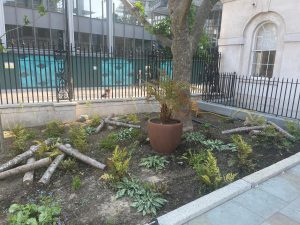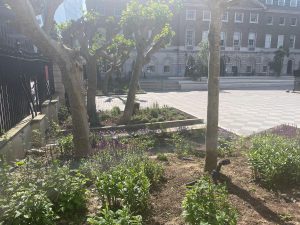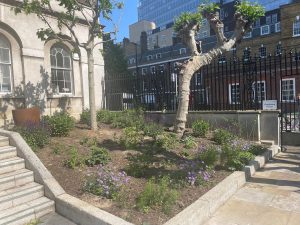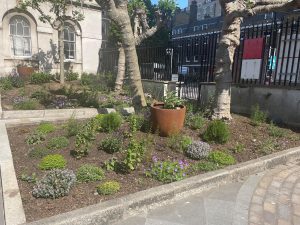This blog post was written by Kathryn Mercedes Cassidy Pachon – King’s student and President and Treasurer of the King’s Cycling Club – and Lukas Popp – a third-year International Relations student and Cycling Project Coordinator for King’s Climate Action Network.
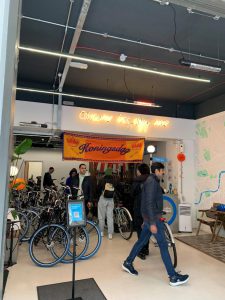 London’s finest gray skies gracefully appeared for the King’s Cycling Tour with Swapfiets, where a dozen or so of King’s bike enthusiasts came together to share the experience of cycling in the heart of the city. It offered an opportunity for more experienced cyclists to explore sneak routes and access options to King’s campuses, but especially for those unaccustomed to the hustle and bustle of city life, it was meant to allay the fear of this and showcase the joy and convenience of cycling in London. Members of the King’s Cycling Club (KCC) committee guided the group from the Swapfiets store in Spitalfields West through the back streets of the Barbican, down to the magnificent Strand campus, south across the river and then through the infamous Stamford Street directly to Guy’s campus and back to Swapfiets: A truly sustainable trip around the great King’s College campuses dotted all over the city.
London’s finest gray skies gracefully appeared for the King’s Cycling Tour with Swapfiets, where a dozen or so of King’s bike enthusiasts came together to share the experience of cycling in the heart of the city. It offered an opportunity for more experienced cyclists to explore sneak routes and access options to King’s campuses, but especially for those unaccustomed to the hustle and bustle of city life, it was meant to allay the fear of this and showcase the joy and convenience of cycling in London. Members of the King’s Cycling Club (KCC) committee guided the group from the Swapfiets store in Spitalfields West through the back streets of the Barbican, down to the magnificent Strand campus, south across the river and then through the infamous Stamford Street directly to Guy’s campus and back to Swapfiets: A truly sustainable trip around the great King’s College campuses dotted all over the city.
The mission of this collaboration between the King’s Sustainability Team and the King’s Cycling Club was to eradicate the fear of cycling among the big “boys,” the trucks, the cabs, the buses, as well as jaywalkers, unpredictable Deliveroo drivers, and electric scooters; in other words, the plethora of potentially disheartening factors that might prevent students and faculty alike from cycling in and around the city. Prior to our adventure, the group gathered for a team meeting discussing the rules and guidelines on how to cycle safely in the city, ensuring that everyone was up to speed on cycling etiquette, obeying the rules of the road, and instilling confidence in cyclists that they have a right to ride on the road. And off they went. The Swapfiets city bikes rolled smoothly and adapted perfectly to the riders’ abilities. To adhere to the traffic-friendly rules established, the group was split into two, with one rider following shortly behind the other on their bike. When arriving back at the store, the group was in high spirits. It seemed like everyone was more confident in their abilities as urban cyclists, and even those who had less experience with biking seemed undeterred, rather encouraged to bike more. This Sustainability Event thus embodied the KCC’s beliefs that the best way to get around the city is by bicycle, not least for reasons of accessibility and sustainability, and that this opportunity should not be hindered by the challenge of cycling in one of the world’s busiest cities, but rather inspired to cycle appropriately and safely.
Cycling is a fantastic way to get active and get around London. As a collaborative event, the King’s Experience Ride forms part of the wider King’s Climate Action Network and its King’s Cycling Project. The latter works mainly on three goals. Firstly, through communication with King’s Residences and Campus Operation Teams, abandoned bicycles are located, assessed and donated to charities, as well as returned to the King’s community in order to make personal transport more climate neutral. Each year, more than 50 bicycles are left on campus and at King’s residences. This has led to a review of cycling at King’s, and the redistribution of these bikes is thus a major focus of the project. Further, it seeks to raise awareness of King’s facilities to educate staff and students who wish to bike on how to access and implement this option for them. Finally, and as the broader framework in which the event explained above also sits, the goal is to promote bicycling as a carbon-neutral, enjoyable, and independent active transportation option for students, staff, and visitors at King’s.
Lukas, a third-year International Relations student and Cycling Project Coordinator for King’s Climate Action Network, said, “It’s sad to think of how many bikes are left abandoned on our campuses when, at the same time, we realize that there are plenty of students who would love to cycle but can’t afford to do so. This is why I’m excited about our King’s Cycling Project, which not only allows us to offer students the opportunity to experience cycling in London and breathe new life into old bikes, but also helps to make individual transport more accessible, sustainable and independent.”
If you would like to get involved with the King’s Climate Action Network, visit the website to find out more.

